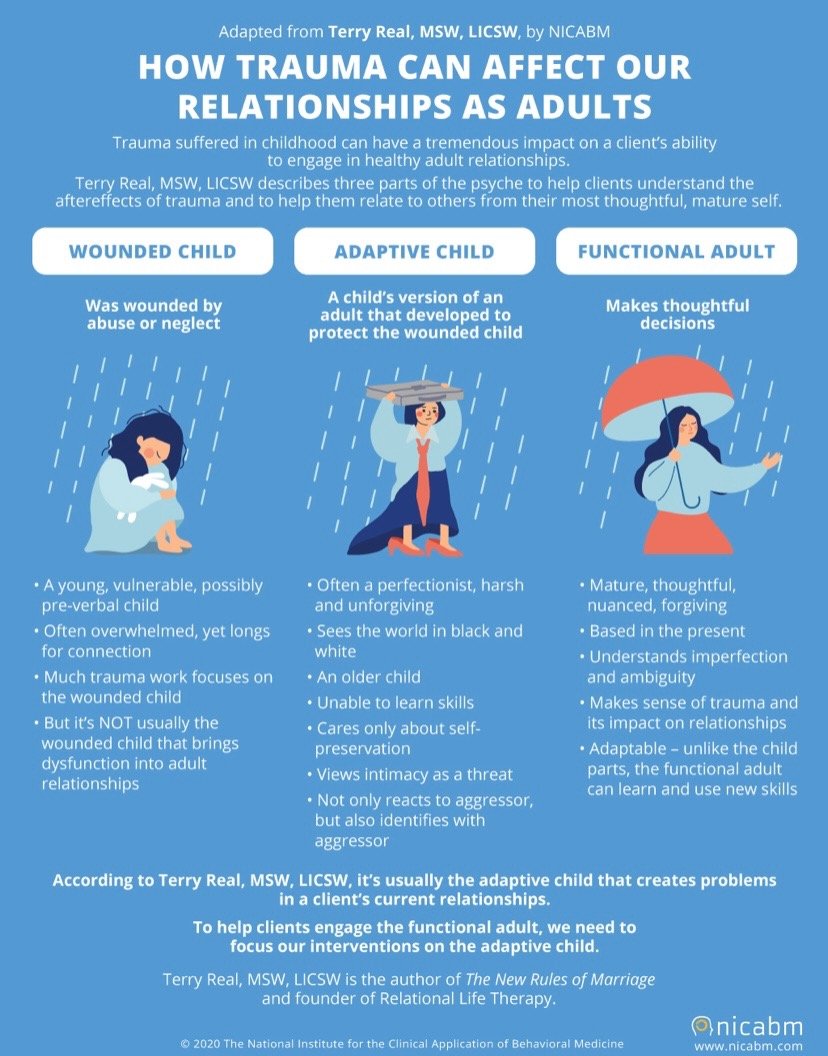Relationships: The Adaptive Child vs. The Functional Adult
Most adults have heard the term “wounded” or “inner” child, often referring to a part of self that was emotional injured during childhood. This wounding happens in the face of neglect, verbal abuse, physical abuse, and/or unmet needs. Much therapeutic work focuses on understanding this part of self and learning to heal the hurts.
There is another part of self that hasn’t received as much attention in writings, but is equally important to understand. Sometimes called the “adaptive” child, this is the part of self that learned protective mechanisms to counteract their experience. Children are resilient and when their needs are unmet, they adapt their behavior and strive toward fulfilling their needs. The adaptive child is the creation of a behavior that serves as protection as well as a medium to get what you wanted as a child, i.e. attention, space, etc. If your family was critical and there was no room for your voice, the adaptive child may withdrawal, pout, and/or stonewalling (which is a silent retreat often in the face of overwhelm). If your family was combative and loud, the adaptive child may have learned to yell and be fierce in engagements. Often the adaptive child is rigid, involves black and white thinking, perfectionist qualities, and a lack of vulnerability.
Terry Real, author and therapist, explains how the adaptive child impacts relational interactions, especially partnerships. Due to the wounds the adaptive child is protecting, distance from vulnerability is the main goal. The adaptive child takes the “me vs. you” stance in relationships rather than a collaborative stance of “us.” This safeguarding part of self stays in the security of being an individual, an island of sorts, which works in opposition to the goal of most relational experiences, which is to be seen, loved, and part of a team. Depending on the level of childhood trauma, the adaptive child can be difficult to manage and easily triggered.
Real, and the therapeutic work he has created called Relational Life Therapy, references the importance of gearing our healing toward the needs of the adaptive child in order to invite another part of self to the interactions. The goal is to move toward the “functional adult” or as Real calls it the “wise adult.” The functional adult is more relational and collaborative. This part of self wants to be part of a team and honor the “us” in a union. The wise adult is more relaxed, forgiving, flexible, and warm.
How do you engage the wise adult? The first step is identifying your adaptive child and it’s behaviors. Then it is important to understand the goals of the behaviors. The healing will come when you learn to soothe your adaptive child with compassion. Once the adaptive child is soothed it makes more room for the functional adult to show up.
Another important step in evoking the functional adult is prioritizing being in a relational “us” experience rather than a “you vs. me” relationship. We are biologically programed to want deep social connection. We long to be seen, witnessed, and understood. This can only happen within a team framework and not when we posture antagonistically.
Please check out the attached infographic as well as any of Terry Real’s books for a deeper dive into the importance of soothing the adaptive child and creating an “us” connection in your partnerships.
